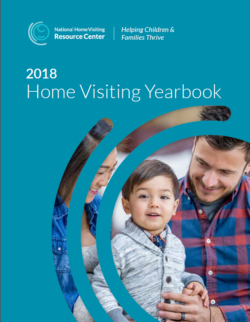The 2018 Home Visiting Yearbook uses 2017 data to present the most up-to-date look at home visiting on the national and state levels. It provides critical information on who provides home visiting, where programs operate, the families and children receiving services, and those who could benefit but aren't being reached.
Highlights
The Yearbook features data from evidence-based home visiting models and awardees of the Maternal, Infant, and Early Childhood Home Visiting Program (MIECHV). For the first time, it highlights data from nine emerging models.
Data are presented in multiple formats:
- 1 national profile
- 52 state profiles
- 1 tribal profile
- 26 model profiles
- 54 MIECHV state data tables
A new infographic provides an at-a-glance look at what home visitors do and how their work can help children and families.
Take-Home Messages
- More than 300,000 families received evidence-based home visiting services in 2017 over the course of more than 3.5 million home visits.
- An additional 28,700 families received home visiting services from 9 emerging models that do not yet meet standards of evidence as determined by HomVEE. These 9 models provided more than 400,000 home visits in 2017.
- About 18 million pregnant women and families (including more than 23 million children) could benefit from home visiting but were not being reached in 2017. These numbers have held steady since 2015.
- Evidence-based home visiting was implemented in all 50 states, the District of Columbia, 5 territories, 25 tribal communities, and 53 percent of U.S. counties in 2017.
- States continue to support home visiting by combining funds from tobacco settlements and taxes, lotteries, and budget line items. With limited resources, states are working to expand the reach of home visiting and serve as many families as they can in a way that makes sense on a local level.
- MIECHV has strengthened home visiting by supporting services, research, and local
infrastructure since 2010. MIECHV expired in September 2017 but was reauthorized in February 2018 for an additional 5 years. - In 2017, MIECHV helped fund services for more than 81,000 families in states, territories, and tribal communities—a portion of the total families served by home visiting that year.


